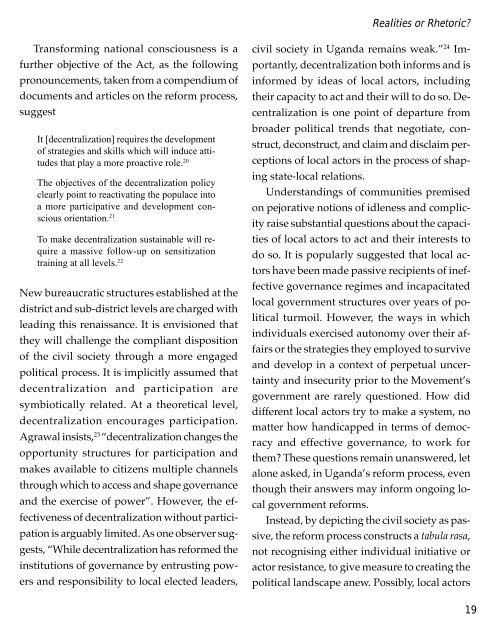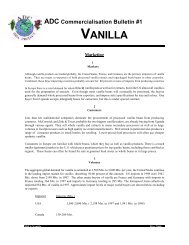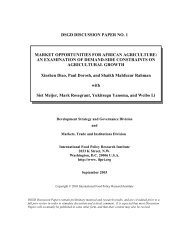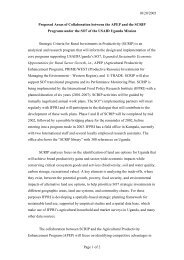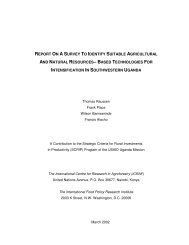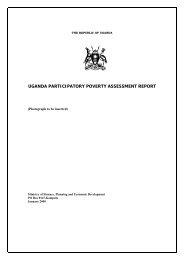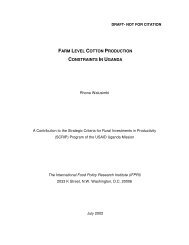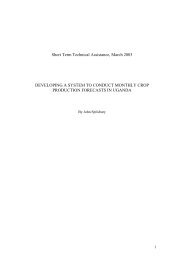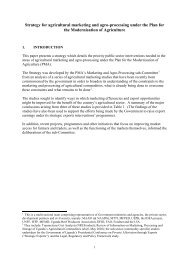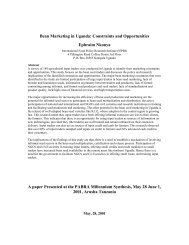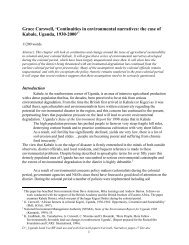Decentralisation in Uganda Rhetoric-Chapter3. - Foodnet
Decentralisation in Uganda Rhetoric-Chapter3. - Foodnet
Decentralisation in Uganda Rhetoric-Chapter3. - Foodnet
Create successful ePaper yourself
Turn your PDF publications into a flip-book with our unique Google optimized e-Paper software.
Transform<strong>in</strong>g national consciousness is a<br />
further objective of the Act, as the follow<strong>in</strong>g<br />
pronouncements, taken from a compendium of<br />
documents and articles on the reform process,<br />
suggest<br />
It [decentralization] requires the development<br />
of strategies and skills which will <strong>in</strong>duce attitudes<br />
that play a more proactive role. 20<br />
The objectives of the decentralization policy<br />
clearly po<strong>in</strong>t to reactivat<strong>in</strong>g the populace <strong>in</strong>to<br />
a more participative and development conscious<br />
orientation. 21<br />
To make decentralization susta<strong>in</strong>able will require<br />
a massive follow-up on sensitization<br />
tra<strong>in</strong><strong>in</strong>g at all levels. 22<br />
New bureaucratic structures established at the<br />
district and sub-district levels are charged with<br />
lead<strong>in</strong>g this renaissance. It is envisioned that<br />
they will challenge the compliant disposition<br />
of the civil society through a more engaged<br />
political process. It is implicitly assumed that<br />
decentralization and participation are<br />
symbiotically related. At a theoretical level,<br />
decentralization encourages participation.<br />
Agrawal <strong>in</strong>sists, 23 “decentralization changes the<br />
opportunity structures for participation and<br />
makes available to citizens multiple channels<br />
through which to access and shape governance<br />
and the exercise of power”. However, the effectiveness<br />
of decentralization without participation<br />
is arguably limited. As one observer suggests,<br />
“While decentralization has reformed the<br />
<strong>in</strong>stitutions of governance by entrust<strong>in</strong>g powers<br />
and responsibility to local elected leaders,<br />
Realities or <strong>Rhetoric</strong>?<br />
civil society <strong>in</strong> <strong>Uganda</strong> rema<strong>in</strong>s weak.” 24 Importantly,<br />
decentralization both <strong>in</strong>forms and is<br />
<strong>in</strong>formed by ideas of local actors, <strong>in</strong>clud<strong>in</strong>g<br />
their capacity to act and their will to do so. Decentralization<br />
is one po<strong>in</strong>t of departure from<br />
broader political trends that negotiate, construct,<br />
deconstruct, and claim and disclaim perceptions<br />
of local actors <strong>in</strong> the process of shap<strong>in</strong>g<br />
state-local relations.<br />
Understand<strong>in</strong>gs of communities premised<br />
on pejorative notions of idleness and complicity<br />
raise substantial questions about the capacities<br />
of local actors to act and their <strong>in</strong>terests to<br />
do so. It is popularly suggested that local actors<br />
have been made passive recipients of <strong>in</strong>effective<br />
governance regimes and <strong>in</strong>capacitated<br />
local government structures over years of political<br />
turmoil. However, the ways <strong>in</strong> which<br />
<strong>in</strong>dividuals exercised autonomy over their affairs<br />
or the strategies they employed to survive<br />
and develop <strong>in</strong> a context of perpetual uncerta<strong>in</strong>ty<br />
and <strong>in</strong>security prior to the Movement’s<br />
government are rarely questioned. How did<br />
different local actors try to make a system, no<br />
matter how handicapped <strong>in</strong> terms of democracy<br />
and effective governance, to work for<br />
them? These questions rema<strong>in</strong> unanswered, let<br />
alone asked, <strong>in</strong> <strong>Uganda</strong>’s reform process, even<br />
though their answers may <strong>in</strong>form ongo<strong>in</strong>g local<br />
government reforms.<br />
Instead, by depict<strong>in</strong>g the civil society as passive,<br />
the reform process constructs a tabula rasa,<br />
not recognis<strong>in</strong>g either <strong>in</strong>dividual <strong>in</strong>itiative or<br />
actor resistance, to give measure to creat<strong>in</strong>g the<br />
political landscape anew. Possibly, local actors<br />
19


